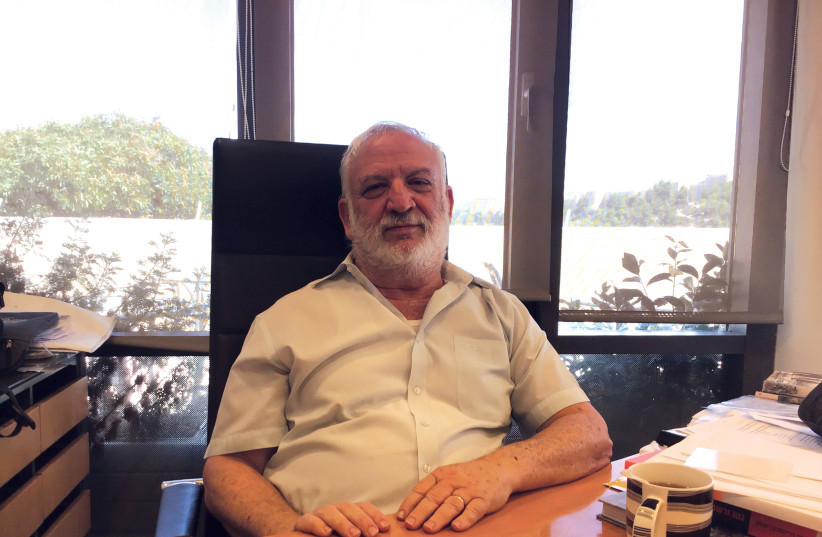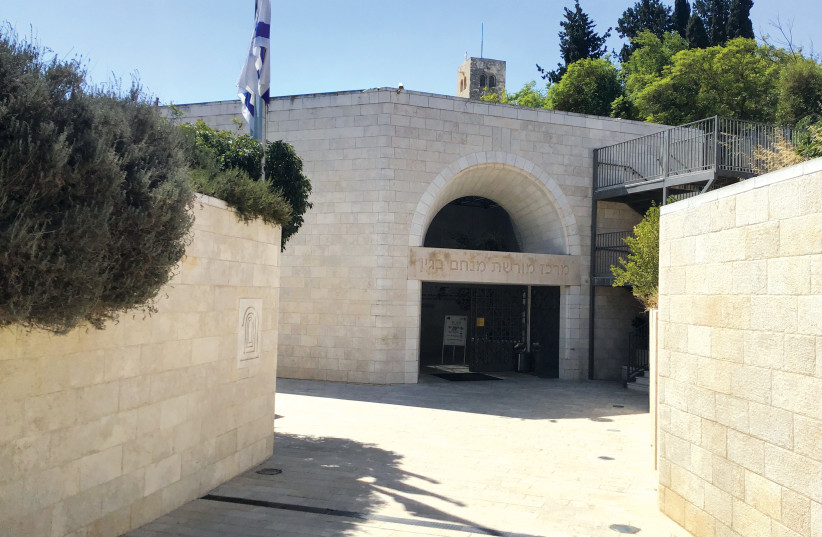Herzl Makov is CEO of the Menachem Begin Heritage Center, a national center to commemorate Israel’s sixth prime minister. Serving as a fighter pilot in the Israeli Air Force, obtaining the rank of major, his squadron participated in the IAF’s bombing of Osirak, Iraq’s nuclear reactor, in 1981 – under the orders of Menachem Begin. This decision established what was called “the Begin Doctrine” – no country with the declared aim of destroying Israel would be permitted to acquire the means to do so.
Born in Binyamina, Makov, 65, is married with four daughters and grandchildren. He holds a degree in Public Policy from the Hebrew University of Jerusalem, was one of the founders of Ein Prat: the Academy for Leadership and served as chairman of the Board of Directors. He served as director of the Prime Minister’s Office and held positions in the Jewish Agency and the World Zionist Organization before taking up his position at the Begin Heritage Center, where I interviewed him.

Tell us about the Begin Center.
We opened in 2004, actually we worked to establish in 1993 a year after Menachem Begin died, it was passed in the Knesset a law to commemorate Menachem Begin because it was a consensus in Israel, which as you know is not likely to happen (Laughs) that he had a very important role in the history of the state of Israel. So, our parliament decided to commemorate his activities, his biography and his legacy.
Tell us about Menachem Begin.
Menachem Begin’s story symbolizes the story of the Jews in his generation. He was born in east Europe in exile to a very conservative traditional Jewish family, he grew up getting Jewish education, belonged to a Jewish Zionist youth movement, became the leader of it and then World War Two broke out and he ran away and was arrested by the Russians.
Then because of the agreement between England and Russia which included an establishment of a free Polish army he was released from the Soviet prison and came to Palestine.
After a very short period he became the commander of the Irgun, the underground that fought the British mandate in order to achieve sovereignty and independence to the Jewish state according to the original British mandate that was given by the League of Nations in 1922. After the War of Independence, he decided to join political life, serving 29 years as the head of the opposition and in 1977 he became the prime minister of the State of Israel. In his term of six years, it was very intensive and a shaping term in the history of the State of Israel.
When you talk about his story it sounds like you are reading some pages from the Bible!
Yes, in a way, sometimes I am saying it’s a story of a biblical hero or a Greek tragedy or something like that. He was a commander in the Irgun, which was a prelude to the current day IDF. In Palestine under the British government there were a few Jewish underground, the Haganah was the most established one and the biggest and there was the Irgun and the Stern group, the Irgun was built as an army actually, they established the guerrilla fighting so there was a lot of inspiration I would say to the Israeli army from the Irgun but the nucleus of the IDF is more the Haganah and the Palmach.
After fighting the British in his youth, how did the British respond to him later on when he became prime minister?
In that sense it was good that it took almost 30 years so the British had time to relax a bit in the beginning of the State of Israel; they didn’t like him at all. They didn’t let him go to Britain, we also have correspondence between the British government and the US government, not to let him come to the United States because (they argued) he was a terrorist. He was Number 1 on the wanted list of people in Palestine at that time.
He moved from being a so-called terrorist to the prime minister?
Yes, he never saw himself as a terrorist but as a freedom fighter but it is not just a title that you give yourself, he had a distinction between terrorist and fighter because his organization never attacked civilian targets, only military and government. Of course, when you fight there are casualties of innocent people, but always a target of his struggle was either governmental target or military bases, military objects.
Tell us about the museum, and what can you see here?
In the center of the [Heritage] Center is the museum that tells the story of Begin’s life, from his early childhood to the end of his career as prime minister but we also bring two other layers to his story, one which I call the type or model of leadership that Menachem Begin brought to us a leadership which I call “value driven leadership” It wasn’t the poll of yesterday night or not the headline of tomorrow’s newspaper that drove his decisions but a set of values that we bring to the audience and we show, and you can see that all his life was a struggle to fulfill those values, you can agree or disagree with those values but you can see that that was his motive and the other thing is what can we now learn from his legacy, what is relevant to Israel and the Jewish people and to the world nowadays from his legacy.
What sort of programs do you run here?
Besides the museum which is open to the general public, we have educational programs, we have programs about leadership, again value driven leadership, we try to bring it to every person’s life. We are all kind of leaders, whether you are a journalist, a teacher, whether you are running a commercial business, you are a leader, and how the set of values affects your way of behavior and so forth, so it is an example of how we take Begin’s legacy into our life. We have other educational programs and we have again for example when Menachem Begin was prime minister, he used to learn every Saturday night the portion of the Bible that is read in the synagogue on the same day, so we here again every Thursday night we have a study of the bible to again bring his legacy to the daily life of the people today.
What sort of archives do you have here?
The archive includes all the documents, Written, audio, video concerning Menachem Begin, again from his early childhood he had to go to Belarus, The town where he was born in Belarus, so we went to their archive to get all the documents about his family, about his early childhood, we gather archive from all his chapters in life because he didn’t care so much about commemorating himself, so he didn’t have an organized archive, we had to do a lot of research to get all those papers.

How important was Menachem Begin to the State of Israel?
In a way, the State of Israel that you see today is the work of Menachem Begin. As I said, his term was very active. We can start with the peace treaty that he brought with Egypt, which was the largest enemy state that we had, all the wars of Israel between 48 to 77 until Menachem Begin came to power was initiated by Egypt and by the way since then we didn’t have a war with an Arabic state because Egypt was the leader in the Arabic world. So, the peace changed the geostrategic situation of Israel for sure. Then he changed our society, we were a socialist very centralist society and economy, he brought the liberal society, the liberal economy to us and that drove Israel up regarding our status in the world, the economy and other elements, but I have to mention that although he was for a free market, he was very sensitive to social justice, he believed in social justice. We have to create a free market but also the role of the state is to make sure that to the lower classes, economy-wise the state is going to t
ake care of them.
Then of course there was the Egypt peace deal in 1979 for which he won the Nobel Peace Prize.
Yes, he won the first Nobel Peace Prize in Israel for the outstanding achievement of achieving peace with Egypt. He and president Anwar Sadat both got the prize in 1978.
What was your response to Begin’s decision to strike Osirak, Iraq’s nuclear reactor, 40 years ago?
When I learned of the operation, I was amazed by the courage and daring of our prime minister, the government, and the leadership of the army to take such a brave action.
Why do you do what you do here at the Begin Center?
Personally, I believe very much the world view of Menachem Begin and model of leadership is very relevant to the issues, to the challenges that Israel and in a way the world is facing. So, I believe it is a mission to bring those values to the next generation of the state of Israel.
Did you ever meet him?
Yes, I had the privilege of meeting him when I was a child. I lived in a small moshav (Town or settlement) which was the first moshav of the Irgun people so he came to visit a few times. I even had the privilege of being a waiter to his table when there was some celebration, I was 15 and they didn’t hire professionals so I had that privilege. Then I met him once when he was prime minister, I was in the army at the time, more than that I didn’t have the privilege to work with him or learn from him personally.
What is your hope for the future of the center?
I hope that we will continue to succeed in the work that we are doing because when I compare the other centres in Israel, thank God we are doing very well regarding the public that are coming, regarding the quality of the programs that we give the people So, I hope that God will give us the guidance to continue and to spread the word of Menachem Begin.
What is your website?
Yes, of course. We are in the digital world. We also have a Facebook page and our website is the Begin Center Jerusalem. www.begincenter.org.il
